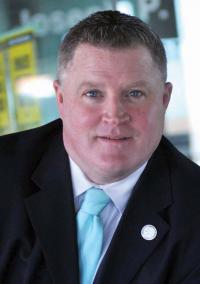October 22, 2015
 Philip J. Carver New role at UMass BostonAfter 13 years as president of the Pope’s Hill Neighborhood Association, Philip J. Carver announced earlier this month that he would be stepping down to spend more time with his family and focus on his new responsibilities at UMass Boston.
Philip J. Carver New role at UMass BostonAfter 13 years as president of the Pope’s Hill Neighborhood Association, Philip J. Carver announced earlier this month that he would be stepping down to spend more time with his family and focus on his new responsibilities at UMass Boston.
He has been named the university’s associate director of community relations and economic development, a position that will see him acting as the university’s liaison to city, state and federal government agencies as well as to local residents.
While he’ll be taking a step back from the association (PHNA), Carver said his new role at UMass will allow him to stay involved with the community he’s been proud to serve for over a decade. “Pope’s Hill has been a catalyst for my career. I owe everything to the community,” he said in an interview. “The 15 years I spent there, it wasn’t a chore.”
The 47-year-old Carver has been a prominent figure in the community ever since he got involved with PHNA in 2000 while also serving as a passionate civic leader and board member for a number of area schools and organizations. A Dorchester native who grew up on Pope’s Hill, he attended St. Ann’s School (now called Saint John Paul II Catholic Academy-Neponset) and received his bachelor’s and master’s degrees at UMass Boston. He worked at the Massachusetts Department of Transportation for ten years, where he served as chief of staff before joined the UMass Boston community in 2007.
Carver has been recognized for his civic activism over the past decade, receiving the Action for Boston Community Development’s Outstanding Volunteer Award and Vargas & Vargas, Inc.’s Boston’s Best Neighbor Award. He was also honored with the Boston Business Journal’s prestigious “40 under 40” Award, which recognizes 40 promising Greater Boston business and civic leaders under the age of 40 who have made significant contributions in their fields.
Carver and his wife, Pamela, had just gotten married and moved into his childhood home when he got involved in the civic association. One of many younger Dorchester residents who joined the PHNA for the same reason, he said he wanted to stay informed about a burgeoning building boom he saw happening across his neighborhood. The combination of the diverse skills of younger PHNA members and the institutional knowledge of older members fostered an enterprising new strategy to development within the association, a process that Carver has held onto throughout his time as president.
“What made us unique is we took a proactive approach to community, whether that be community development, community planning, or community engagement,” Carver said. “We’ve done a lot of cutting edge stuff that I think the community should be proud of.”
Under his leadership, the PHNA helped bring charter schools into the community, participated in public/private land development projects, started a parks collaborative, and launched a youth summer arts program.
But perhaps his most lasting contribution to the Pope’s Hill community has been the Greater Neponset Flag Football League, which he spearheaded into existence five years ago after seeing that the neighborhood needed an inexpensive recreational program.
“We wanted to do something that was low key, low maintenance, and fun,” he said.
The league, started with seed funding from a monetary award Carver received when he was named Boston’s Best Neighbor, is open to kids across the city for just $25 annually. Next year, Carver said, he’s planning to expand the program by getting lights donated and starting a Friday night teen program.
Looking ahead for the PHNA, Carver said that a continued focus on smart growth and development in Dorchester is going to be key for his successor, John Schneiderman, a former PHNA vice president.
Schneiderman agreed, and said that as president he will prioritize collaboration across Dorchester’s neighborhood groups in order to fully address the transformative development projects planned for the area.
“I want us all on the same page, I want to support the other neighborhood groups just like I want them to support us on issues,” said Schneiderman.
For Carver, unity in the neighborhood is essential to cultivating a pragmatic approach to the city’s latest building boom. “When you’re looking at development civically, you need to look across the community rather than focus on one single development project. I think that’s going to be something that all of the civic associations on the Morrissey corridor are going to need to address,” he said.
And while Schneiderman said he’s up to the task of taking over at PHNA, he knows he and the other PHNA executive board members will need to lean on Carver on some issues, and draw from his experiences. He said he’s doubtful that Carver, whom he called a “friend, and a great family man,” will be able to fully retire from his role as a dedicated civic leader.
“We’ll miss him being involved, but I know he won’t step back – he’ll stay involved in the neighborhood,” he said. “I know my phone will be ringing.”
Topics:


